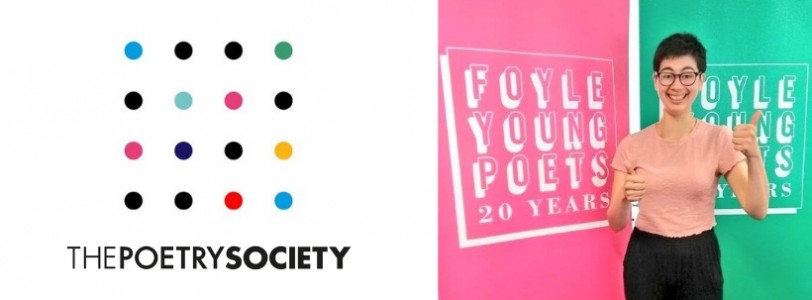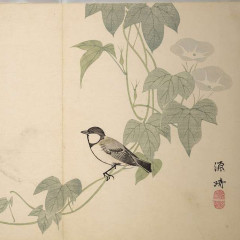Hi Helen, could you first introduce yourself to the reader?
Hello! I’m Helen Bowell, Education Co-ordinator at The Poetry Society in London.
What does your job as an Education Co-ordinator involve?
Lots of delightful poetry things!
Fantastic. What kinds of delightful poetry things?
I run two main projects at The Poetry Society. The first is Young Poets Network, an online platform for young writers up to the age of 25 – so I partner with organisations like Oxfam, the National Maritime Museum and Bletchley Park and commission poets such as Helen Mort, Rishi Dastidar and So Mayer to write prompts and run free poetry competitions called ‘challenges’.
I market the competitions, write newsletters, send the entries onto the judges, contact all the entrants with the results, publish the young people’s brilliant winning poems on our website and post out their prizes. There might also be an anthology of the poems from the challenge, so I’ll write copy for that and liaise with our Publications Manager on the design.
Sometimes there are associated poetry readings too, such as the ones at the National Maritime Museum and the Nearlyology event at The Poetry Café last year – it’s always lovely to meet the young poets in person. And of course, I’ll collect stats on the numbers of entrants to each challenge, how many views our website gets and so on, to report to our funders and make each challenge better.
We also have articles, or ‘features’, on the website with reviews, think pieces, and top tips from/interviews with leading poets – last summer we did a Foyle Friday series featuring poets like Jay Bernard, Sarah Howe, Phoebe Power, Peter LaBerge, Ian McMillan and many more. Sometimes we are able to approach young poets to write challenges and features for us, too, and I edit their work.
What other projects do you have on the go?
The other big project I run is Poets in Schools, a service where we match inspiring poet educators with schools around the UK (and, actually, the world). Sometimes we do bigger projects, like working in 21 Enfield primary schools last year, or the Trafalgar Square Christmas tree project we run every year. This part of my job involves a lot of emailing, budgets, spreadsheets and databases; and it’s so rewarding to hear the positive feedback from teachers.
Smaller projects I look after include Poems on the Underground and Youth and Schools Membership to The Poetry Society – which means I spend a lot of time posting things out across the world. Plus, I also help out with all of our other Education projects, like the Foyle Young Poets of the Year Award for 11 to 17-year-olds, SLAMbassadors for spoken word poets, and PoetryClass, our website for free poetry teaching resources. On a weekly basis there are always more projects popping up: I’ve started running Young Poets Takeover readings/performances for and by young poets in The Poetry Café this year, for instance.
What do you love about your job?
When I was a teenager, I was commended twice in the Foyle Young Poets of the Year Award and it completely changed my life – and now I help to run the Award, and all The Poetry Society’s other young people’s programmes. I get to work on literature projects that I’m really excited about and that I know will change people’s lives, meet incredible poets (young and adult), and work with the loveliest colleagues.
What are the bits you don’t like or find challenging?
Lugging things around and posting them out, I’ll admit, isn’t the most inspiring part of my job. It is very cool to think of all those hundreds of posters I send out on walls in schools and bedrooms across the world, though.
What are the highlights of your career to date?
In this role, I’ve really enjoyed organising and hosting the Young Poets Takeovers – every time, the young people’s performances just take my breath away. I also love writing challenges for Young Poets Network, being able to reward young writers for their work and build relationships with them. Every time I receive an email saying ‘this has made my day’ makes my day, too.
Apart from this job, I worked for seven months in Alsace, France as a language assistant with the British Council. That was excellent and I still miss the beautiful countryside there, and the challenge of speaking another language every day.
How did you get into an arts job? Have you also worked outside the arts?
When I was at school I had no idea that ‘arts administrator’ was a career. When I left university, I did an internship at The Poetry Society and realised that this whole world existed and was a viable career. After that, I knew I wanted to work in the literature sector and just kept applying and applying to relevant things. I’ve also had a few TEFL jobs which helped secure a role in education, probably.
Can you describe your biggest challenge so far in your career? How did you overcome it?
To be honest, I’ve been extremely lucky. I’ve had a couple of terrible jobs – such as working a 40-hour week in Madrid for no money except accommodation and travel (and a tiny Erasmus grant). It was 40 degrees Celsius every day (35 at night) for eight weeks, and I had no air conditioning at work or home. But I’m very bad at quitting things so I always stick it out, which, ultimately, I think has taught me a lot, even if it was rubbish at the time.
Do you have any related qualifications? If so, what is it and how do you think it’s helped you?
I think to be an arts administrator it’s usually helpful to have an undergraduate degree but it doesn’t really matter what in, as long as you’re passionate about the art form you’ll be working in, and are keeping up with the latest goings-on in that field (e.g. you’re reading books published that year, if you want to work in contemporary literature). So, I have a BA in English, which definitely helps me understand lots of references in the office, but has by contrast definitely not helped me understand Excel spreadsheets any better…
Have you noticed any changes in the industry? If so, what?
I haven’t really been working in this industry for long enough to say, but it’s fairly easy to see when looking back on projects from the early ‘00s that there was a lot more funding and support for many parts of culture and the arts back then than there is now. That’s not to say that there aren’t funds around now though, and we’re still finding ways to do great work.
You’ve been granted the ability to send a message to 16-year-old you. What do you say?
Tell your careers advisors you don’t have to go into teaching or marketing if you study English Literature – arts administration is a career!
Do you have any advice for young people interested in doing your kind of job?
Try and get as much interning/work experience as possible (if you can). If you’re passionate about the arts, get involved with them at college and university – edit or write for student magazines, make your own zines, collaborate with your peers. If you’re interested in literature, read through the features and enter the challenges on Young Poets Network – these have helpful hints about writing and editing but also about putting on events, running magazines and more.
All office experience is good experience for the arts administrator, especially if you’re writing funding bids, working in marketing or events, or partnering with interesting organisations. And just keep applying until you find the job you want – it will come.









0 Comments